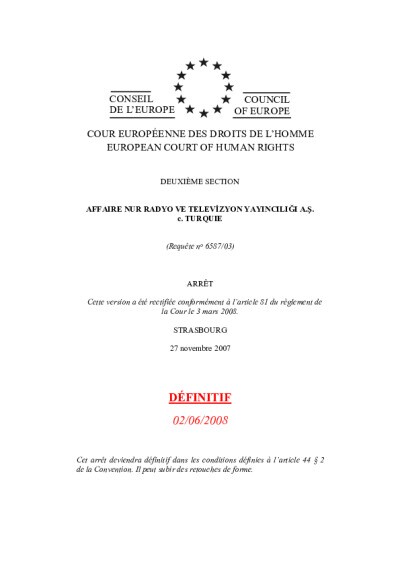
Date
Geographical Area
Europe
Countries
Turkey
Keywords
Jurisdiction
European Court of Human Rights (ECHR)
Case Name
Nur Radyo Ve Televizyon Yayinciligi A.S. v Turkey
Case Reference
Application no. 6587/03
Name of Court
European Court of Human Rights
Key Facts
The applicant, Nur Radyo Ve Televizyon Yayıncılığı A.Ş. was a public limited company which operated as a radio broadcasting company in Istanbul. In 1999, the applicant broadcast comments describing the Marmara earthquake which killed thousands of people as a warning from Allah and a punishment against non-believers (“c’est l’avertissement clair d’Allah aux ennemis d’Allah”).
The Radio and Television Council said the broadcast of this information was a violation of Article 4C, Law No.3984 according to which dissemination may not be carried out contrary to principles set out in the Constitution. Noting that the company had already been subject to a warning for an infringement of this same principle, the RTÜK (Radio ve Televizyon Üst Kurulu) decided to suspend the right to broadcast the radio station for 180 days.
The applicant appealed to the Administrative Court of Ankara denying the allegations and claimed to have presented a religious explanation for the earthquake. The Administrative Court dismissed the action for suspension stating that the comments made were contrary to general principles of the Constitution.
The applicant then brought a case to the European Court of Human Rights alleging a violation of Article 10 ECHR in conjunction with Article 14 stating that the temporary ban infringed the right of freedom of thought, conscience, religion and expression.
The Radio and Television Council said the broadcast of this information was a violation of Article 4C, Law No.3984 according to which dissemination may not be carried out contrary to principles set out in the Constitution. Noting that the company had already been subject to a warning for an infringement of this same principle, the RTÜK (Radio ve Televizyon Üst Kurulu) decided to suspend the right to broadcast the radio station for 180 days.
The applicant appealed to the Administrative Court of Ankara denying the allegations and claimed to have presented a religious explanation for the earthquake. The Administrative Court dismissed the action for suspension stating that the comments made were contrary to general principles of the Constitution.
The applicant then brought a case to the European Court of Human Rights alleging a violation of Article 10 ECHR in conjunction with Article 14 stating that the temporary ban infringed the right of freedom of thought, conscience, religion and expression.
Decision and Reasoning
The Court considered whether the interference with the applicant’s right to freedom of expression was provided for by law and pursued a legitimate aim within the meaning of Article 10 ECHR. The Court had to consider whether this interference was “necessary” in a democracy stating “le différend porte sur la question de savoir si l’ingérence était « necessaire » dans une société démocratique.”
The Court referred to various case-law on the subject. It also referred to the adjective “necessary” implying that there must be a pressing social need. The Court recognised the gravity and seriousness of the remarks made, however the Court held that as shocking and offensive as they may be, the remarks did not incite violence or stir up hatred. The Court referred to the severity of the sentences imposed and how the measure in question was in fact disproportionate in relation to the aim pursued. The Court thus concluded there had been a violation of Article 10 and considered it unnecessary to examine the complaint under Article 14 (prohibition of discrimination).
The Court referred to various case-law on the subject. It also referred to the adjective “necessary” implying that there must be a pressing social need. The Court recognised the gravity and seriousness of the remarks made, however the Court held that as shocking and offensive as they may be, the remarks did not incite violence or stir up hatred. The Court referred to the severity of the sentences imposed and how the measure in question was in fact disproportionate in relation to the aim pursued. The Court thus concluded there had been a violation of Article 10 and considered it unnecessary to examine the complaint under Article 14 (prohibition of discrimination).
Outcome
The Court unanimously held that the application was admissible and that there had been a violation of Article 10 ECHR. It held that there is no need to examine the complaint under Article 14 ECHR separately.
The applicant claimed damages of over €1 million, but the Court held it was unable to arrive at a precise quantification of the financial losses which the temporary closure in question caused; and that the finding of a violation constitutes in itself sufficient just satisfaction for the non-pecuniary damage suffered by the applicant.
The applicant claimed damages of over €1 million, but the Court held it was unable to arrive at a precise quantification of the financial losses which the temporary closure in question caused; and that the finding of a violation constitutes in itself sufficient just satisfaction for the non-pecuniary damage suffered by the applicant.
Link
Disclaimer
This case law summary was developed as part of the Disaster Law Database (DISLAW) project, and is not an official record of the case.
Document
Document